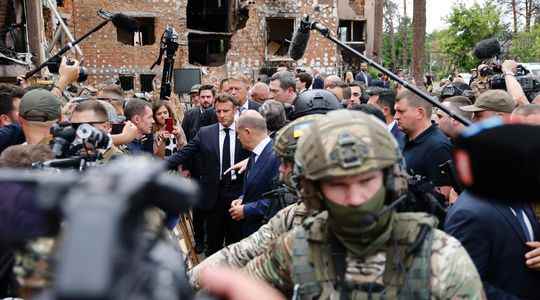The European Commission is due to deliver its opinion on Ukraine’s EU candidate status on Friday. On Thursday, during a visit to the country alongside his French and Italian counterparts, German Chancellor Olaf Scholz wanted to be reassuring, saying that “Ukraine is part of the European family”. The three leaders, as well as their Romanian counterpart, said they were ready to “immediately” grant the country the status of candidate for membership of the European Union. This, “for Ukraine, can strengthen freedom in Europe and become one of the key European decisions of the first third of the 21st century”, pleaded in the wake of President Volodymyr Zelensky.
Whatever the sensitivity of the Commission to the idea of a Ukraine as a bulwark against Moscow, the main difficulty will remain to succeed, next week, in achieving unanimity within the EU – the countries of Eastern Europe ‘Is, sensitive to the threat at their borders being rather for, others like Denmark or the Netherlands are more reserved. The Twenty-Seven must indeed decide, during a summit on June 23 and 24, if they grant Ukraine this official status of candidate, the start of negotiations which could last for years. But, beyond the more or less long-term political and economic benefits (with the initiation of significant financial aid intended to support reforms and reconstruction), in the short term, acceptance of his candidacy would have a eminently symbolic for kyiv.
- To qualify for EU membership, Ukraine must meet several criteria
If Ukraine obtains the official status of EU candidate, this will be subject to conditions and will have to be validated unanimously by the twenty-seven members before the start of long negotiations with a view to its accession. To be a candidate, a country must satisfy a series of political criteria (democracy, rule of law, protection of minorities), economic (viable market economy) and commit to integrating the rules of European law.
The President of the European Commission, Ursula von der Leyen, who has visited Ukraine twice, admitted that the authorities of this country had “done a lot” in view of their candidacy submitted in February, believing however that it there was still “a lot to do”, particularly in terms of the fight against corruption and respect for the rule of law. In Ukraine, corruption remains endemic: in its 2021 report, the NGO Transparency International ranks it 122nd out of 180. This is better than in 2014 (142nd), but still very far behind its EU neighbors (the least well placed, Bulgaria, is in 78th place).
- Ukrainian cereals: Macron proposes to go through Romania
During his visit to kyiv on Thursday, the French president explained that France was helping Romania to transit the large quantities of cereals blocked in Ukraine in the absence of a “framework” allowing them to leave through the Black Sea at because of the Russian blockade. “We will continue the diplomatic showdown against Russia, with the UN Secretary General, to use the port of Odessa as a maritime exit door for seeds (corn, wheat…)” which are blocked”, he underlined last night on TF1.
But “because Russia refuses”, “we are working on another way, which is to go through Romania”, Odessa being only “a few tens of kilometers” from the Ukrainian-Romanian border. Because this would allow “to be able to access in particular the Danube and the railways” in order to transport these cereals to international markets. Without reaching an agreement so far, the UN has been negotiating for several weeks with Moscow, kyiv and Ankara, the military guarantee of the use of the Black Sea for civilian ships to get grain out of Ukraine safely. and to reintroduce fertilizers produced by Russia on the international market. If an agreement were reached, it would lower commodity prices and mitigate the food crisis in the world, which is worsening due to the Russian invasion.
- Russia ‘will never take control’ of Ukraine
According to the British Chief of the Defense Staff, Russia has “already lost strategically” its war in Ukraine and “will never take control” of the country. “President Putin has used 25% of the power of his army to reap tiny territorial gains,” Admiral Tony Radakin told the British agency PA on Friday. And this even if “Russia will perhaps have tactical successes in the coming weeks”, he admitted, while the Ukrainian forces are in difficulty in the Donbass region in the east of the country.
Nearly four months after the start of the Russian invasion, Vladimir Putin’s army “will soon be short of men and soon short of sophisticated missiles”, says Tony Radakin. London also indicated on Wednesday that it would deliver “imminent” multiple guided rocket launcher systems known as GMLRS to Ukraine, which is demanding this type of armament whose range and precision exceed those of Russian artillery.
